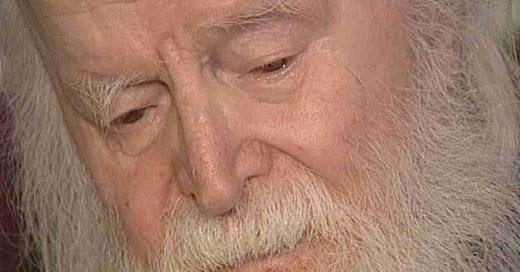Elder Sofian and Psalm 50
He did not stop saying the Psalm for even a moment, but he would resume it at once, before even taking a breath: it was in fact his true nourishment…
Wednesday, 11 August 1999: the day is eclipsed by the sun. In the morning I receive a phone call. I am told that Father [Sofian] suffered a stroke during the night, that he no longer recognizes anyone, that he does not respond to questions, does not eat, does not drink, does not know anything, but continuously says Psalm 50.
12 hours have passed since he has been in this state.
After the doctor left, Father sat on the edge of the bed again, as he was sitting before, and again said Psalm 50. He was saying it without stopping, softly, but with determination. He would skip some lines, others he would repeat many times. Most frequently he returned to: “Create in me a clean heart, O God, and renew a right spirit within me.” He repeated this many times in a row and after, still with closed eyes, with his mind as if fully immersed within himself: “Do not cast me away from Your presence, and take not Your Holy Spirit from me.”
The prayer sounded so coherent! Father’s face was so peaceful and clear and not even his eyes, seemingly more tightly closed, did not betray the “eclipse”—as he later called it, a “personal eclipse”—which he was experiencing. It was in fact an unceasing prayer which he seemed to hold onto with all of his being, with all of his power. The eye closed to the outside [world] awoke within him a contemplation, which the prayer worked on its own.
The nurses said that he would not receive food. I insisted that they feed him because he had diabetes and things could become complicated. Between two verses of the Psalm, Father accepted a teaspoon of soup, after honey and orange juice. He did not stop saying the Psalm for even a moment, but he would resume it at once, before even taking a breath: it was in fact his true nourishment, and between these large drops of the Psalm he would swallow a teaspoon of tea with honey or juice.
After a short time he went to sleep, then he awoke without recognizing anyone. His face was clear, bright, and joyful. After a few hours he was taken to his cell, to his own bed, to the light of the candle which he always kept lit.
That night he continued to say, more weakly or with more force, but all the time, absolutely all the time, without stopping, Psalm 50. There was a resolute will in [his saying it], a will which did not let itself be defeated. It seemed to me that the antennas of his soul (that “something” of his soul) almost knew that by saying it continuously, in this Psalm lay all of his salvation.
I also began to say it, out loud, quietly. Father wanted, so I too wanted, to be heard. The hushed cry of Father had the force of insistence. Although appearing absent from all his surroundings, Father was, while uttering the Psalm, very present; the words were said sometimes clearly, sometimes stumbling, but with zeal, with faith, with conviction.
The belief in the power of this Psalm was transmitted to me as well. That night I received the gift of Psalm 50 with its saving power and I believe that it helped and saved Father Sofian in this impasse.
The second day, on August 12, Father sat on the edge of his bed. He was like a new man—reborn. He looked around, he spoke, he recognized everyone.
Afterwards, I asked him why Psalm 50. He responded that it is the Psalm most implicated in the services of the Orthodox Church: we find it in the Morning Prayers, in Vespers, and in other moments of the services, and in the Liturgy at the Cherubic Hymn when the priest says in his heart: “Create in me a clean heart, oh God, and renew a right spirit within me.”
After only a few months, I met Father Sofian in Germany, at Bad Rappenau, where he was recommended for recovery treatment.
There, on the second day after I arrived, Father had the strength to do a blessing with holy water. It was October 10, 1999, Sunday afternoon. I lit a candle. At this service Father commemorated those close to him in Romania and Germany. He prayed for the Romanian and German people. The candle burned all night without extinguishing, it burned in the morning until 1 pm, when we had to move to another location.
We were leaving and I could not bear to blow out the candle which had been burning continuously for 20 hours. I took it like that in my hand, in the car. I held it in the wind, I carried it without a worry everywhere, thinking that it would blow out. But it did not extinguish. It burned for 70 hours without interruption. It surprised me, it made me happy and this uncommon thing moved me. Father, however, was undisturbed, remaining himself as always.
by Mariana Macri from Părintele Sofian (București: Editura Bizantina, 2011).




